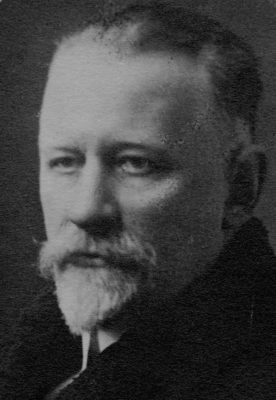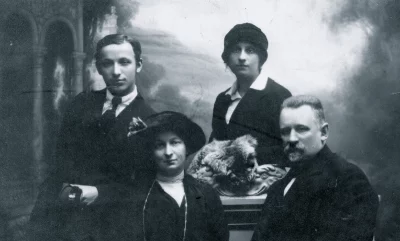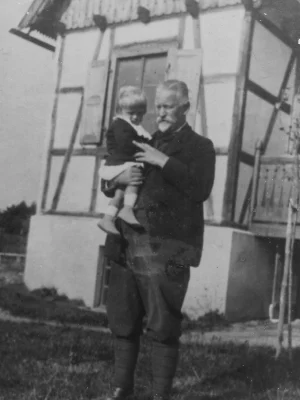Kazimierz Pawłowicz was born in Kalisz, Poland on 14th January 1869 but lived in Lithuania during his childhood when his father moved from Kalisz to establish himself on the Powyrwicie manor.
Kazimierz was an engineer in the brick-making and construction business, who made his fortune building/managing brick factories in Russia and Japan and later developing housing estates in Poland.
He died in Warsaw on June 16th 1927.
Family Background
His parents were Edward Pawłowicz, born in Żmudź /Samogitia (1837-1895), and Marja Szaniawska (1840-1905).
He had 3 brothers: Jan Pawłowicz, Józef Pawłowicz and Edward Pawłowicz Junior and 5 sisters: Jadwiga, Marja, Aniela, Zofia and Wanda.
Although most of his family stayed in Lithuania, he chose to move to Poland quite young. He did his engineering studies at the renowned Jagiellonian University in Kraków and then moved to Warsaw, where he married Helena Bożeniec- Jełowicka in 1895. Both his children, Krystyna and Bohdan, were born in Warsaw.
From 1901 to 1902, the family moved to Dąbrowa Górnicza and in 1902 to Korwinów, where he was appointed director of the “Korwinów” brick factory near Częstochowa. Some memories from this period are recounted by his son, Bohdan, in a fragment of the article “Wspomnienia z dzieciństwa” (Memories of Childhood). We learn that he was a member of the PPS, a newly founded party primarily focused on Polish independence. During autumn 1904, due to a ” wild” strike by the workers at the brick factory , he was arrested by the Russian police and spent several months in a prison in Raków, Częstochowa until he was released early summer 1905.
From from 1906 to 1910, he traveled extensively with his family to Italy, France and Germany. In 1909 he made a year-long round-trip with his son to Japan through Russia. Also in 1909 he returned to Warsaw, where he established his own technical consulting office first on Krucza Street with Wilcza and finally on Kanonia 14, which had been undergoing renovations since 1911 under the direction of architect Teofil K. Wiśniowski. It became the family residence from 1913 to 1924 and remained in the Pawłowicz family until 1944, when it was completely destroyed during the bombing of Warsaw by the Nazis.
Projects
City Garden Czerniaków (Miasto-Ogród Czerniaków)
Kazimierz Pawłowicz was a member of the board of directors of the Czerniakow Garden City Parcel Company and was considered one of the creators of the Czerniaków Garden City, a villa estate in Warsaw, now better known as old Sadyba. He commissioned the document for the company that parceled the local land for development, signed on November 26, 1921. Kazimierz contributed not only with his expertise in transforming a general business idea into a viable settlement but also facilitated the provision of a water and sewage system through his connections. His acquaintance with the director of the city’s waterworks, Edward Szenfeld, who owned a plot of land across the street at Goraszewska 7, enabled this development.
In 1924 Kazimierz built his own large house at Goraszewska 8 on a 1,300 sq meter plot and in 1925 his family was one of the first to move to this green neighbourhood. Unfortunately, he died two years later of complications arising of an apendicitis, at the age of 56. His family remained in the house until 1935, when they moved to Łodz, while his widow stayed there until 1944.
The Pawlowicz’s family house was the only one from the whole estate to be looted and set on fire by the Germans in October 1944, after the Warsaw Uprising, during World War II. Today, this large plot of land on which it stood, is called Skwer Starszych Panów (Elderly Gentlemen’s Square), a public green space, bordered by Goraszewska, Jodłowa, Zakręt, and Kąkolewska Streets.
Hawk Mountain (Jastrzębia Góra)
Willa Pawłowicz was one of the first houses on Jastrzębia Góra, a well-known seaside resort on the Polish Baltic Coast. It was designed and built by Kazimierz Pawłowicz between 1921-1922. The family would spend the summer holidays there until the war, after which it was abandoned and occupied by gipsy families. It was renovated after a fire in 2005.
View from Jastrzębia Góra – today’s intersection of Rozewska and Promenada Światowid. Houses in the foreground: “Kaszubka” (on the left) and Kazimierz Pawłowicz’s villa (now renovated).
Books
Kazimierz Pawłowicz wrote two books:
- Cegielnictwo (Volume I, II, III and IV) Warsaw: Gebethner and Wolff. 1923, 1924, 1927.
- Drogi wodne Polski – Prace Zarządy Żeglugi i Dróg Wodnych Nakładem Banku Kredytowego. Warszawa – 1919.
Archival Internet Resource: https://zbc.ksiaznica.szczecin.pl/dlibra/show-content/publication/edition/1695?id=1695
Sources
Primary
- Family Photo Albums
- Family Documents
Secondary
Pawłowicz, B. (1966). Wspomnienia z dzieciństwa. Kronika Pismo Dla Wszystkich, London nr 51/52.



